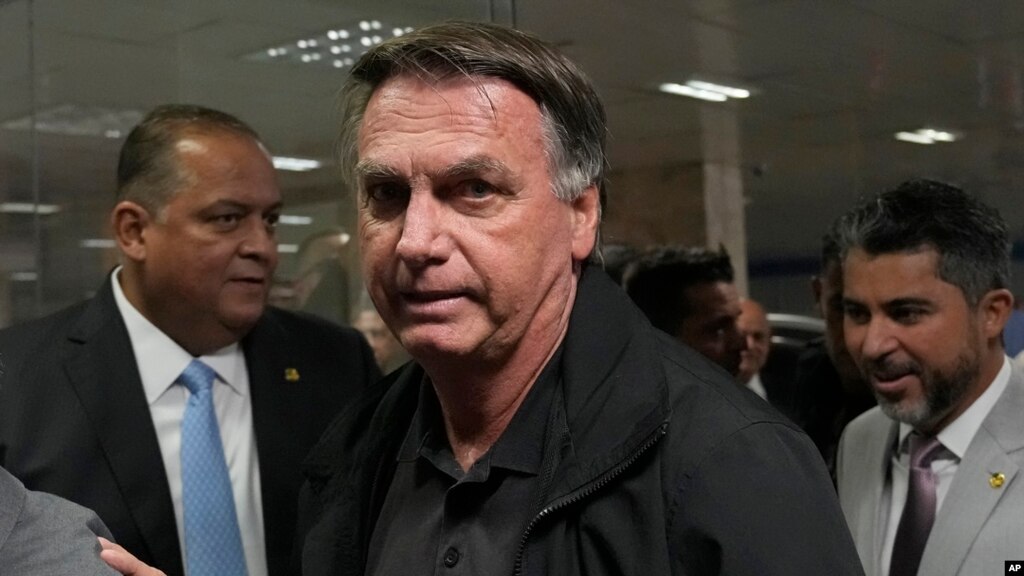
Former Brazilian President Jair Bolsonaro faces trial in Brasília over an alleged coup attempt. Image: VOA.
(The Post News) – Brazil is navigating unprecedented political and legal waters with former President Jair Bolsonaro and seven of his closest advisors, four of them senior military officers, on trial in the Supreme Court for allegedly attempting to stage a coup to overturn the 2022 election.
The far-right ex-president, who was in office from 2019 until 2023, is accused of masterminding a failed coup attempt to stop President Luiz Inácio Lula da Silva’s inauguration following his narrow election victory. Prosecutors claim Bolsonaro’s camp spent months conspiring to suspend democracy, intimidate the military, and ultimately create what Supreme Court Justice Alexandre de Moraes called “a veritable dictatorship.” Bolsonaro could spend over 40 years in prison if convicted.
Bolsonaro: A Trial Without Precedent
There have been more than a dozen coup plots in Brazil since the abolition of the monarchy in 1889, including the 1964 US-backed military coup that led to two decades of dictatorship, according to historians. Never before, though, has a former president or senior military leader been held to account for attempting to overthrow democracy.
“Completely unprecedented and historic,” said Danilo Araújo Marques of the Federal University of Minas Gerais. “Whenever in the history of Brazil there was a failure of a coup attempt, amnesty was granted. Institutions are standing firm this time.” The trial will last for eight broadcast sessions from September 2 until September 12. Five justices will vote separately, with a majority needed to convict.
Allegations of Coup and Assassination
Bolsonaro faces five charges: conspiracy to commit a coup, heading an armed criminal organization, conspiracy to overthrow democratic rule by using violence, causing damage to federal property, and causing damage to national heritage. Prosecutors claim that in late 2022 Bolsonaro showed military commanders a draft decree to invalidate Lula’s election. Although the army and air force declined, Navy commander Adm. Almir Garnier Santos is said to have endorsed it.
Prosecutors also cite evidence of a conspiracy to assassinate President Lula, Vice President Geraldo Alckmin, and Justice Moraes. Former presidential advisor Lt. Col. Mauro Cid has admitted under a plea bargain, providing prosecutors with internal messages and draft coup decrees. The trial has triggered a diplomatic storm. Bolsonaro’s close ally, US President Donald Trump, denounced the trial as a “witch-hunt.” Trump imposed 50% tariffs on Brazilian imports and sanctioned Justice Moraes and canceled visas of other Supreme Court justices and Lula’s ministers.
Eduardo Bolsonaro, the son of the former president, moved to Washington this year in a bid to influence Trump officials. Trump’s pressure campaign aims to revive Bolsonaro’s political fortunes and set the stage for a future bid to unseat Lula, according to analysts. Thomas Shannon, a former US ambassador to Brazil, cautioned the intervention could rebound: “It reflects such a cartoonish understanding of Brazil. Instead of rescuing Bolsonaro, Trump may be digging his political grave.”
President Lula has responded to Trump’s behavior by adopting a nationalist platform. He has worn a blue cap to rallies with the words “Brazil belongs to the Brazilians” inscribed on it, a direct reference to Trump’s “Make America Great Again” election slogan.
Polling suggests Lula’s popularity has increased as Brazilians have rallied in opposition to what they perceive as US interference. Meanwhile, Bolsonaro’s fortunes have declined, especially since the beginning of his house arrest in early August. His residence has been under tight security after police discovered documents indicating that he was going to fly to Argentina and request asylum from President Javier Milei.
As hearings resume, Brazil braces for mass protests. Pro-Bolsonaro elements are planning Independence Day protests demanding his acquittal, while security forces have been deployed around the Supreme Court, Congress, and presidential palace to prevent a recurrence of the January 8, 2023, insurrections.
Conservative daily O Estado de São Paulo greeted the trial as a “gigantesco salto civilizatório,” and O Globo wrote that Brazil had broken its “humilhante tradição” of embracing coup-plotters. Brazil’s democracy is undergoing an “ácido teste,” historian Marques said: “As instituições estão sendo provadas, mas isso pode acabar por fortalecê-las.” Yet he warned the story might not have a verdict. “If Bolsonaro were convicted, Congress might call for an amnesty, or some future president might pardon him. The rhythm of Brazilian politics is unexpected.”
The Supreme Court decision, scheduled for September 12, will decide whether Bolsonaro remains under house arrest, spends years in prison, or receives a lighter punishment. A conviction would clinch his disqualification from office until at least 2030, and an acquittal could add fire to his political resurgence. As Brazil and the world hold their collective breath, its largest trial in decades is underway, a trial not just of the destiny of one man but of the mettle of South America’s largest democracy.



